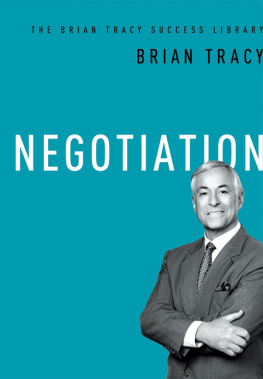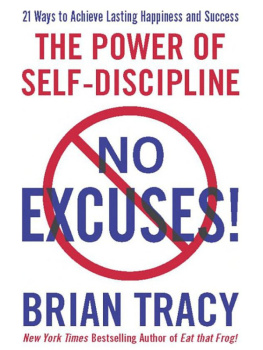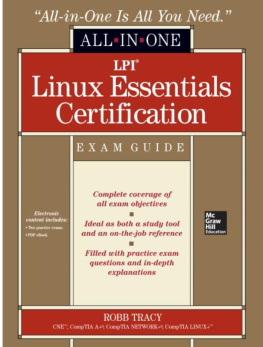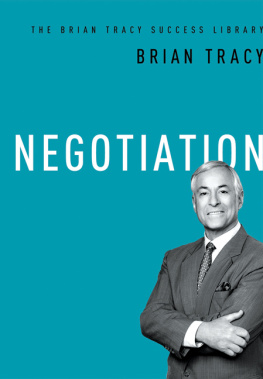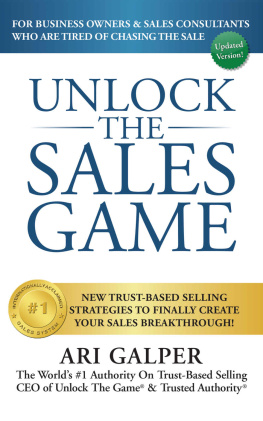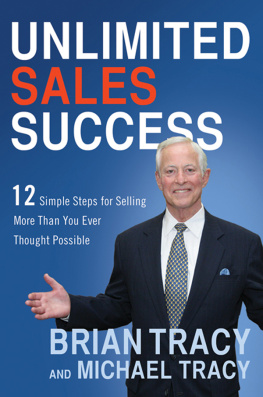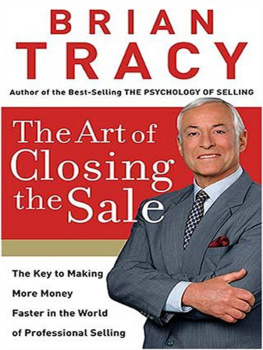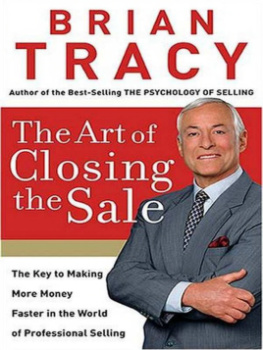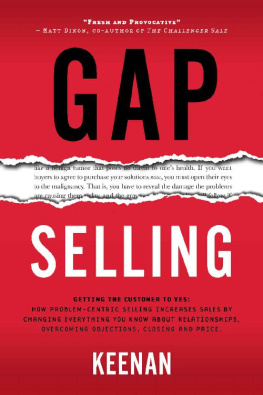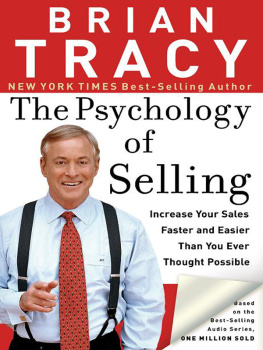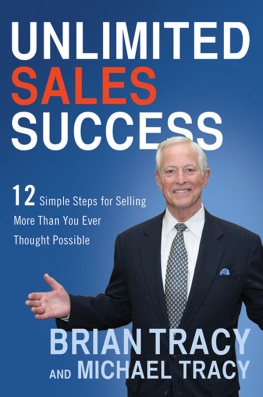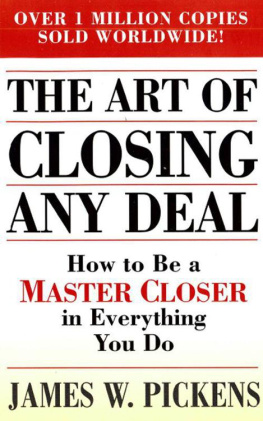The
Psychology of
Selling
The
Art of Closing
Sales
Brian Tracy
The
Psychology of
Selling
The
Art of Closing
Sales
Brian Tracy
MCMLXXXVII
Contents
How You Can Benefit Most from This Program........................4
1. The Psychology of Selling.......................................5
2. Developing a Powerful Sales Personality............................7
3. Why People Buy...............................................9
4. Creative Selling..............................................11
5. Approaching the Prospect......................................13
6. The Sales Process.............................................15
7. The Psychology of Closing......................................17
8. When Objections Get in the Way.................................19
9. Winning Closing Techniques I..................................21
10. Winning Closing Techniques II................................23
11. Managing Your Time Efficiently................................25
12. Ten Keys to Success in Selling..................................27
How You Can Benefit Most From This Program The final value to you of The Psychology of Selling
Use This Guide
will depend on how many of its insights and guidelines you can, or choose to, adopt as routine ways of thinking After hearing a session, refer to the corresponding and acting. Youll be wise to listen to each audio session section of this guide. Here youll find a useful summary several times. Dont expect to get full value from these of the main points discussed and suggestions for putting sessions if you hear them only once. Even the most the ideas to work in your life.
intelligent, thoughtful listener needs to hear sessions
Act on Your Ideas
such as these several times to be able to pick up, think over and internalize all the ideas discussed. Also, each Until intelligent thought is linked with appropriate repeated listening will spark for you additional ideas action and follow-through, little or nothing is that apply to your current needs and goals.
accomplished. So once youve grasped a particular idea or technique and how to apply it, act put it to work in
Make Concentrated Listening a Habit
your career. The results may seem slow at first, but if Set aside a short period each morning or evening, or youre determined to stick with the program, youll soon both, when you can listen with full attention to the discover that youre closing more sales and reaping the sessions with which you are working. This does not in greater cash rewards that come to the top sales any way preclude casual listening while youre driving professional.
your car, dressing, eating or exercising, for example. It is simply a more concentrated form of listening.
Jot Down Your Ideas
Whenever youre listening, keep pen and paper at hand, and be prepared to stop your audio player at any time.
When you hear an idea or technique that particularly appeals to you, stop the audio. Think about the idea.
Think about it in connection with your situation, your work, your life-style. Think about its value to you how it could change and improve what you are doing. Think about how you can apply it, visualize yourself doing so and making it pay off for you. Jot down some notes to remind yourself of your thinking and to help you take action during the days ahead. Then restart the audio and continue listening.
The Psychology of Selling
Session One
SELF-ASSESSMENT
We always sell in a manner consistent with our self-1. Am I proud of my profession?
concept. Some of us are uneasy about picking up the phone and calling somebody. Some of us feel 2. Am I in the top 20 percent of salespeople?
uncomfortable about closing. By becoming more skilled, 3. Do I genuinely like myself?
we feel more competent, raise our self-concept and 4. Is there any aspect of selling that makes me become more successful.
uncomfortable?
5. Does my self-concept include a high level of The core of self-concept is self-esteem. A person with income?
high self-esteem likes himself. How much you like 6. Can I cope with the rejection that I will inevitably yourself is the key determinant of your performance and encounter in selling?
your effectiveness in everything you do.
SUMMARY
There are two major obstacles in selling. The first The most important thing we have to understand in the obstacle is the customers fear of making a mistake. The world of selling is that nothing happens until the sale second major obstacle in selling is the salespersons fear takes place. The most successful organizations in the of rejection. Until a salesperson develops confidence, a world have superb selling organizations. They rise or high self-concept and sufficient resilience to bounce fall on the quality of their sales effort. We can be proud back from inevitable rejection, he cannot sell to be salespeople because it is upon our efforts that the successfully. All outstanding salespersons have reached whole economy floats. There is no limit to where we can the point where they no longer fear rejection.
go in this profession if we are properly trained and skilled in selling.
Sales are usually based on friendship. People will not buy from you until they are genuinely convinced that In selling, the 80-20 rule, or the Pareto principle, you are their friend and are acting in their best interest.
prevails. According to the 80-20 rule, 80 percent of sales There is a direct relationship between your level of self-are made by 20 percent of the salespeople. Once you get esteem and how well you get along with different into the top 20 percent, you dont have to worry about people. The best salespeople have a natural ability to money or employment again. Your job is to get into the make friends easily with perspective customers.
top 20 percent and then into the top 4 percent. In the top 4 percent, you become one of the highest paid A key element in selling is enthusiasm. A sale is a people in the world. The purpose of The Psychology of transfer of your enthusiasm about the product or Selling is to show you how to achieve that goal.
service into the mind and heart of the other person.
The winning edge theory says that the difference The reason so many people fail in sales is that they do between top performers and average or mediocre not stay with it long enough to get those first few performers is not a great one. It is always just a small winning experiences that raise their self-esteem and self-difference: Top performers just do certain things a concept and set them off on a successful career in certain way a little bit better each day. If you develop selling. Thats why its so important that from the ver y that winning edge, theres no reason why you cannot beginning you say to yourself that nothing is going to move rapidly into the top 4 percent.
stop you until you are successful.
Selling is an inner game. That is, what is going on inside the mind of the salesperson makes all the difference in his success. We know there is a direct relationship between a salespersons self-concept and his sales performance and effectiveness. We feel uncomfortable if we dont act in accordance with our self-concept. We will never earn much more or much less than our self-concept level of income. Our job is to raise this self-concept level of income.




